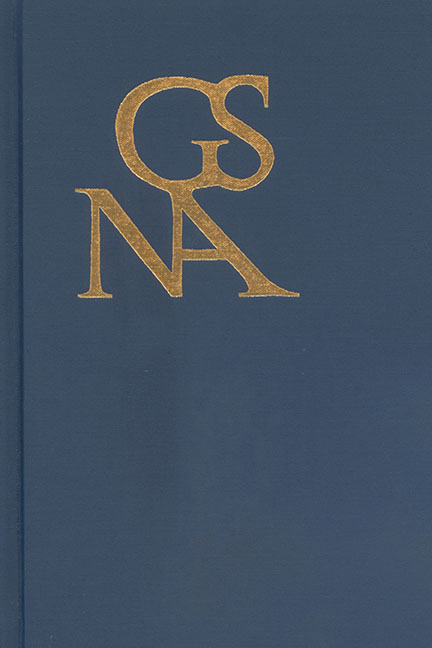Temporary Canonicity and the Horizontal Perspective: Digitization and the Emergence of “Forgotten Canons”
Published online by Cambridge University Press: 28 October 2020
Summary
IN THIS CONTRIBUTION, I argue that easy access to large amounts of digitized eighteenth-century materials along with the ready availability of computational processes to analyze them produces a shift in perspective toward these materials, thus presenting new opportunities for research into historical cultural contexts, such as the Goethezeit. Predigital research has tended to focus on historically vertical perspectives, both culturally (creating canons, frequently national) and socially (creating historical narratives, frequently national histories, with canonical events, figures and sources). By contrast, the study of large corpora with the help of computational methodology can establish horizontal perspectives that reassemble contemporary contexts that (may) have been obscured by the delimiting barriers of canon and nation. These new perspectives are particularly (but not exclusively) significant for research on historical cultures. They are perhaps especially significant for historical modern cultures, which have produced large amounts of written, published materials, through which obscured cultural aspects and constellations can be reconstructed with some degree of reliability, due to the copious material.
I will illustrate the emergence of such a horizontal context and the resulting change in perspective through the example of an author who was highly respected at the time, Ernst Brandes, and his widely read text, Politische Betrachtungen über die französische Revolution (Political observations on the French Revolution). Though both the author and his text have now largely been forgotten, a horizontal analysis of this writer and his “best seller” illustrates my argument for the reconstruction of “forgotten canons.” In such horizontal contexts, certain texts and authors enjoy what one might call “temporary canonicity”: popular and respected, they connected with contemporary interests or issues to such an extent that they became representative of “their time,” but failed to become “classics.” In this respect, they delineate historical change: once relevant and much read, but now consigned to the realms of mediocrity and oblivion. To a greater extent than their “classic” contemporaries, these writers and their reception provide access to contexts around 1800 that is otherwise difficult to acquire, while their dismissal at the same time illuminates the dynamics of reception histories.
Ernst Brandes (1756–1810) was a Hanoverian civil servant who published widely on social and political issues of the day.
- Type
- Chapter
- Information
- Goethe Yearbook 27 , pp. 215 - 224Publisher: Boydell & BrewerPrint publication year: 2020



